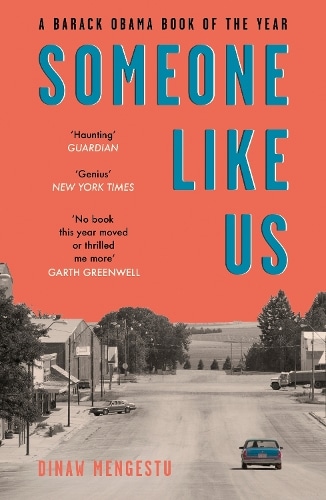
 Back from Yorkshire (more of which later in the week) with the last of July’s previews. It’s a long time since I read Dinaw Mengestu’s All Our Names but it’s stayed with me as did Children of the Revolution. His new novel, Someone Like Us, follows Mamush who returns to his Ethiopian community in Washington DC from Paris when his marriage comes close to collapse after five years. The day of his arrival, his father is found dead in his garage sending Mamush off on a journey across the States seeking answers to questions he never felt able to ask. ‘Breath-taking, commanding, unforgettable work from one of America’s most prodigiously gifted novelists’ says the blurb which might sound like hyperbole but given Mengestu’s previous novels I’m prepared to believe it.
Back from Yorkshire (more of which later in the week) with the last of July’s previews. It’s a long time since I read Dinaw Mengestu’s All Our Names but it’s stayed with me as did Children of the Revolution. His new novel, Someone Like Us, follows Mamush who returns to his Ethiopian community in Washington DC from Paris when his marriage comes close to collapse after five years. The day of his arrival, his father is found dead in his garage sending Mamush off on a journey across the States seeking answers to questions he never felt able to ask. ‘Breath-taking, commanding, unforgettable work from one of America’s most prodigiously gifted novelists’ says the blurb which might sound like hyperbole but given Mengestu’s previous novels I’m prepared to believe it.
I’m not entirely sure about Rosie Price’s The Orange Room. I quite enjoyed her debut, What Red Was, but it’s the blurb’s mention of an art theme that’s swung it for me. Home from art school, Rhianne is working in a hotel kitchen hoping to restore her confidence which has taken a bashing in London. Her parents have their eye on her but haven’t bargained on Callum, to whom she’s dangerously attracted. ‘The Orange Room is about what happens when we are too afraid to see the people we love clearly, and too afraid to be seen. It’s the story of a tenacious young woman who – through her art, her courage, her determination – finds her way back to herself’ says the rather woolly blurb. Worth a try, I think.
 Set in Venice in 1958, Rebecca Godfrey’s Peggy reimagines the life of celebrated art collector Peggy Guggenheim. Peggy’s father died on the Titanic when she was only fourteen leaving her a share of his vast fortune hedged about by restrictions. Having faced down sexism and anti-Semitism in Paris and New York, Peggy has established herself as a formidable presence in the post-war art world, content in her independence. ‘Rebecca Godfrey’s final book – completed by her friend, the acclaimed bestseller Leslie Jamison, following Godfrey’s death in 2022 – brings to life the singular woman who helped make the Guggenheim name synonymous with art and genius’ according to the blurb.
Set in Venice in 1958, Rebecca Godfrey’s Peggy reimagines the life of celebrated art collector Peggy Guggenheim. Peggy’s father died on the Titanic when she was only fourteen leaving her a share of his vast fortune hedged about by restrictions. Having faced down sexism and anti-Semitism in Paris and New York, Peggy has established herself as a formidable presence in the post-war art world, content in her independence. ‘Rebecca Godfrey’s final book – completed by her friend, the acclaimed bestseller Leslie Jamison, following Godfrey’s death in 2022 – brings to life the singular woman who helped make the Guggenheim name synonymous with art and genius’ according to the blurb.
I like the sound of the premise for Ewan Gass’s Clinical Intimacy. Contributors to an inquiry into S – from close family and friends to relative strangers and professional contacts – all agree that he’s a charismatic character but an enigma. As they talk, they reveal far more about themselves than they do about S who no one seems able to pin down. ‘In a series of intimate snapshots charting the relations of one ordinary yet extraordinary man, Clinical Intimacy explores the emotional conditions and moral consequences of a life lived in service of satisfying others’ says the blurb, intriguingly.
 In Fríða Ísberg’s The Mark, Iceland is about to hold a referendum to decide whether to accept the universal application of an empathy test which will identify those likely to behave antisocially. The country is bitterly divided (sounds uncomfortably familiar to me) between those who think it will make society safer and others who see it as a violation. Focussing on four people, Ísberg’s novel explores the implications of the potential results: ‘Each of them will have to reckon with uncomfortable questions: Where do the rights of society end and the rights of the individual begin? When does utopia become dystopia?’ asks the blurb.
In Fríða Ísberg’s The Mark, Iceland is about to hold a referendum to decide whether to accept the universal application of an empathy test which will identify those likely to behave antisocially. The country is bitterly divided (sounds uncomfortably familiar to me) between those who think it will make society safer and others who see it as a violation. Focussing on four people, Ísberg’s novel explores the implications of the potential results: ‘Each of them will have to reckon with uncomfortable questions: Where do the rights of society end and the rights of the individual begin? When does utopia become dystopia?’ asks the blurb.
That’s it for July. A click on a title will take you either to my review or to a more detailed synopsis should you want to know more, and if you’d like to catch up with part one it’s here. New fiction is here and here.







